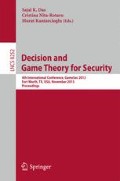Abstract
In this work, we build upon previous results to strengthen the equilibrium concept for rational multiparty computation. We consider only rational players, acting to maximize their utility functions. We consider extensive form dynamic games of imperfect information, using a computational variant of perfect Bayesian equilibrium as the solution concept. We argue that the perfect Bayesian equilibrium is a more appropriate solution concept for multiparty computation, as in cryptographic protocols information is often imperfect by design. Further, the perfect Bayesian equilibrium concept is able to address dynamic games, where players move sequentially rather than simultaneously. By considering players that move sequentially, we are able to remove the assumption of a broadcast channel. Finally, we give novel definitions of privacy, correctness and fairness solely in terms of game theoretic constructs.
Access this chapter
Tax calculation will be finalised at checkout
Purchases are for personal use only
Preview
Unable to display preview. Download preview PDF.
References
Katz, J.: Bridging game theory and cryptography: Recent results and future directions. In: Canetti, R. (ed.) TCC 2008. LNCS, vol. 4948, pp. 251–272. Springer, Heidelberg (2008)
Shoham, Y., Tennenholtz, M.: Non-cooperative computation: boolean functions with correctness and exclusivity. Theor. Comput. Sci. 343, 97–113 (2005)
Asharov, G., Canetti, R., Hazay, C.: Towards a game theoretic view of secure computation. In: Paterson, K.G. (ed.) EUROCRYPT 2011. LNCS, vol. 6632, pp. 426–445. Springer, Heidelberg (2011)
Dodis, Y., Halevi, S., Rabin, T.: A cryptographic solution to a game theoretic problem. In: Bellare, M. (ed.) CRYPTO 2000. LNCS, vol. 1880, pp. 112–130. Springer, Heidelberg (2000)
Halpern, J., Teague, V.: Rational secret sharing and multiparty computation: extended abstract. In: Proceedings of the Thirty-Sixth Annual ACM Symposium on Theory of Computing, STOC 2004, pp. 623–632. ACM, New York (2004)
Lysyanskaya, A., Triandopoulos, N.: Rationality and adversarial behavior in multi-party computation. In: Dwork, C. (ed.) CRYPTO 2006. LNCS, vol. 4117, pp. 180–197. Springer, Heidelberg (2006)
Gradwohl, R., Livne, N., Rosen, A.: Sequential rationality in cryptographic protocols. In: Proceedings of the 2010 IEEE 51st Annual Symposium on Foundations of Computer Science, FOCS 2010, pp. 623–632. IEEE Computer Society, Washington, DC (2010)
Halpern, J.Y.: Beyond nash equilibrium: solution concepts for the 21st century. In: Proceedings of the Twenty-Seventh ACM Symposium on Principles of Distributed Computing, PODC 2008, pp. 1–10. ACM, New York (2008)
Kol, G., Naor, M.: Games for exchanging information. In: Proceedings of the 40th Annual ACM Symposium on Theory of Computing, STOC 2008, pp. 423–432. ACM, New York (2008)
Nojoumian, M., Stinson, D.: Socio-rational secret sharing as a new direction in rational cryptography. In: Grossklags, J., Walrand, J. (eds.) GameSec 2012. LNCS, vol. 7638, pp. 18–37. Springer, Heidelberg (2012)
Halpern, J.Y., Pass, R.: Game theory with costly computation. In: Proceedings of the Behavioral and Quantitative Game Theory on Conference on Future Directions BQGT, vol. 10, p. 1 (2008)
Groce, A., Katz, J.: Fair computation with rational players. In: Pointcheval, D., Johansson, T. (eds.) EUROCRYPT 2012. LNCS, vol. 7237, pp. 81–98. Springer, Heidelberg (2012)
Osborne, M.J., Rubinstein, A.: A Course in Game Theory. MIT Press Books, vol. 1. The MIT Press (1994)
Fudenberg, D., Tirole, J.: Game Theory. MIT Press (August 1991)
Goldwasser, S., Micali, S.: Probabilistic encryption. J. Comput. Syst. Sci. 28, 270–299 (1984)
Harsanyi, J.C.: Games with incomplete information played by bayesian players, i-iii. part ii. bayesian equilibrium points. Management Science 14(5), 320–334 (1968)
Goldwasser, S., Micali, S., Rackoff, C.: The knowledge complexity of interactive proof systems. SIAM J. Comput. 18, 186–208 (1989)
Gordon, S.D., Katz, J.: Rational secret sharing, revisited. Cryptology ePrint Archive, Report 2006/142 (2006), http://eprint.iacr.org/
Micali, S., Shelat, A.: Purely rational secret sharing (extended abstract). In: Reingold, O. (ed.) TCC 2009. LNCS, vol. 5444, pp. 54–71. Springer, Heidelberg (2009)
Fuchsbauer, G., Katz, J., Naccache, D.: Efficient rational secret sharing in standard communication networks. In: Micciancio, D. (ed.) TCC 2010. LNCS, vol. 5978, pp. 419–436. Springer, Heidelberg (2010)
Groce, A., Katz, J., Thiruvengadam, A., Zikas, V.: Byzantine agreement with a rational adversary. In: Czumaj, A., Mehlhorn, K., Pitts, A., Wattenhofer, R. (eds.) ICALP 2012, Part II. LNCS, vol. 7392, pp. 561–572. Springer, Heidelberg (2012)
Zhang, Z., Liu, M.: Rational secret sharing as extensive games. Science China Information Sciences 56, 1–13 (2013)
Shamir, A.: How to share a secret. Commun. ACM 22(11), 612–613 (1979)
Kol, G., Naor, M.: Cryptography and game theory: designing protocols for exchanging information. In: Canetti, R. (ed.) TCC 2008. LNCS, vol. 4948, pp. 320–339. Springer, Heidelberg (2008)
Miltersen, P.B., Nielsen, J.B., Triandopoulos, N.: Privacy-enhancing auctions using rational cryptography. In: Halevi, S. (ed.) CRYPTO 2009. LNCS, vol. 5677, pp. 541–558. Springer, Heidelberg (2009)
Zhang, Z., Liu, M.: Unconditionally secure rational secret sharing in standard communication networks. In: Rhee, K.-H., Nyang, D. (eds.) ICISC 2010. LNCS, vol. 6829, pp. 355–369. Springer, Heidelberg (2011)
Gilboa, I., Zemel, E.: Nash and correlated equilibria: Some complexity considerations. Discussion Papers 777, Northwestern University, Center for Mathematical Studies in Economics and Management Science (June 1988)
Urbano, A., Vila, J.: Computationally restricted unmediated talk under incomplete information. Economic Theory 23, 283–320 (2004)
von Stengel, B., Forges, F.: Extensive-form correlated equilibrium: Definition and computational complexity. Math. Oper. Res. 33(4), 1002–1022 (2008)
Bonanno, G.: Agm-consistency and perfect bayesian equilibrium. part i: definition and properties. International Journal of Game Theory, 1–26 (2011)
González-Díaz, J., Meléndez-Jiménez, M.: On the notion of perfect bayesian equilibrium. TOP, 1–16 (2011), 10.1007/s11750-011-0239-z
Author information
Authors and Affiliations
Editor information
Editors and Affiliations
Rights and permissions
Copyright information
© 2013 Springer International Publishing Switzerland
About this paper
Cite this paper
Wallrabenstein, J.R., Clifton, C. (2013). Equilibrium Concepts for Rational Multiparty Computation. In: Das, S.K., Nita-Rotaru, C., Kantarcioglu, M. (eds) Decision and Game Theory for Security. GameSec 2013. Lecture Notes in Computer Science, vol 8252. Springer, Cham. https://doi.org/10.1007/978-3-319-02786-9_14
Download citation
DOI: https://doi.org/10.1007/978-3-319-02786-9_14
Publisher Name: Springer, Cham
Print ISBN: 978-3-319-02785-2
Online ISBN: 978-3-319-02786-9
eBook Packages: Computer ScienceComputer Science (R0)

